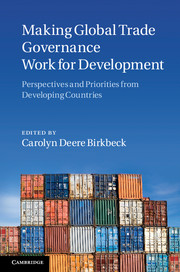 Making Global Trade Governance Work for Development
Making Global Trade Governance Work for Development from Part IV - Making WTO negotiations and decision-making processes fairer
Published online by Cambridge University Press: 07 September 2011
Negotiating new market access and rules in the World Trade Organization (WTO) has become increasingly complex and difficult. The WTO’s maiden trade round, the Doha Development Agenda (DDA), is today the longest running trade round in the history of multilateral trade negotiations. Prior to the DDA’s launch in November 2001, WTO rule-making was restricted to a handful of plurilateral agreements negotiated among the leading exporters of information technology, telecommunications and financial services. In contrast to the lethargy of the multilateral process, there has been a rapid proliferation of regional trade agreements (RTAs), which undermine the multilateral regime’s non-discriminatory norms.
Several factors, past and present, explain the WTO’s negotiating drift and the deadlock that thwarts the conclusion of the DDA. The history of the General Agreement on Tariffs and Trade (GATT) reflects the marginalization of developing country interests; the assertion by the major economic powers of their own market access interests in foreign markets (a mercantilist approach); and trade protectionism in the major developed country markets (Wilkinson 2006a; Finger 2007). This has resulted in an ‘asymmetry of economic opportunity’ against developing countries and the persistence of unbalanced negotiating texts in favour of developed countries in the GATT up to the Uruguay Round (Wilkinson 2006b). In the current Doha Round, the collapse of several ministerial meetings can be partly attributed to the continuation of this protectionist tendency (Ismail 2009a).
To save this book to your Kindle, first ensure no-reply@cambridge.org is added to your Approved Personal Document E-mail List under your Personal Document Settings on the Manage Your Content and Devices page of your Amazon account. Then enter the ‘name’ part of your Kindle email address below. Find out more about saving to your Kindle.
Note you can select to save to either the @free.kindle.com or @kindle.com variations. ‘@free.kindle.com’ emails are free but can only be saved to your device when it is connected to wi-fi. ‘@kindle.com’ emails can be delivered even when you are not connected to wi-fi, but note that service fees apply.
Find out more about the Kindle Personal Document Service.
To save content items to your account, please confirm that you agree to abide by our usage policies. If this is the first time you use this feature, you will be asked to authorise Cambridge Core to connect with your account. Find out more about saving content to Dropbox.
To save content items to your account, please confirm that you agree to abide by our usage policies. If this is the first time you use this feature, you will be asked to authorise Cambridge Core to connect with your account. Find out more about saving content to Google Drive.